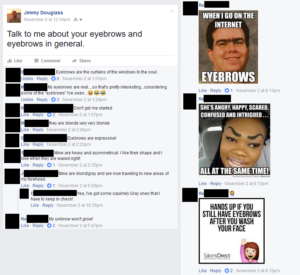Eyebrows, Itches, and It.
So I never got around to posting over the weekend like I should have so this post is going to cover multiple topics from class and from Dante.
Eyebrows
I’m not a super social person, and while I am perfectly fine walking up to my friends and randomly asking them about eyebrows I didn’t have a lot of opportunity to ask people in person over the weekend. However, I did make a Facebook status asking my friends about eyebrows. There are two things I would like to note: “B” is my sister whose concentration in college was English; and the first “M” is my sister in law who is an aesthetician. I found it interesting, though not surprising, that everyone who responded was female. While most posts were humorous, many of my friends seemed to be very conscious of their imperfections that likely remain unnoticed by others.
I found comments referring to eyebrows as “curtains of the windows to the soul” and “expressive” to be interesting in light of our conversation of the eagle’s eye. Dante, rather than having all six kings reside in the eye as David does, chooses to have five of them reside in the eyebrow. Just as the eyebrow represents perhaps the most prominent conveyor of complex emotions, Dante is confused by the presence of pagan kings at the end of the eyebrow. Dante is unable to decipher any sort of simplistic justice, and has difficulty understanding grace and predestination.

Itching Ears
Towards the end of Canto 17 Dante expresses his fears to Cacciaguida that people will not listen to his words. His ancestor replies, “do not resort to lies, let what you write reveal all you have seen, and let those men who itch scratch where it hurts” (206). This eludes to a passage in the Bible:
“I charge [you] therefore before God and the Lord Jesus Christ, who will judge the living
and the dead at His appearing and His kingdom: Preach the word! Be ready in season [and] out of season. Convince, rebuke, exhort, with all longsuffering and teaching. For the time will come when they will not endure sound doctrine, but according to their own desires, [because] they have itching ears, they will heap up for themselves teachers; and they will turn [their] ears away from the truth, and be turned aside to fables. But you be watchful in all things, endure afflictions, do the work of an evangelist, fulfill your ministry.” (2Ti 4:1-5 NKJV)
Cacciaguida is taking up the same mentoring role for Dante as Paul did for Timothy. Both are told to preach truth despite how others will react.
He, She or It?
While talking about the end of Dante’s Paradise, my group discussed the pronouns used for “the Light” or God. We noted how Dante refers to the Light with the pronoun “it” rather than he or she. Dante also talks about what the Light looks like and it’s indescribable beauty. Knowing this is God, it is odd that he never mentions anything God says or does. This contrasts with the God of the Bible who often, though not always, speaks directly to prophets and religious leaders.
In God’s description as “the Light,” God seems completely stripped of personality. Dante also gives us a sense of separation as he writes “O Light Eternal fixed in Self alone, known only to Yourself, and know Self” (394). Dante seems to convey that God is self-sufficient to the point of there being a separation from humanity. This would make sense as in Dante’s time, literacy was only achieved by the wealthy and the officers of the church. There was a gap as only the church could read and interpret the Bible for the public. As there is a hierarchy in Dante’s Paradise, there was a definitive hierarchy between the landowners and peasants of the Middle Ages.
